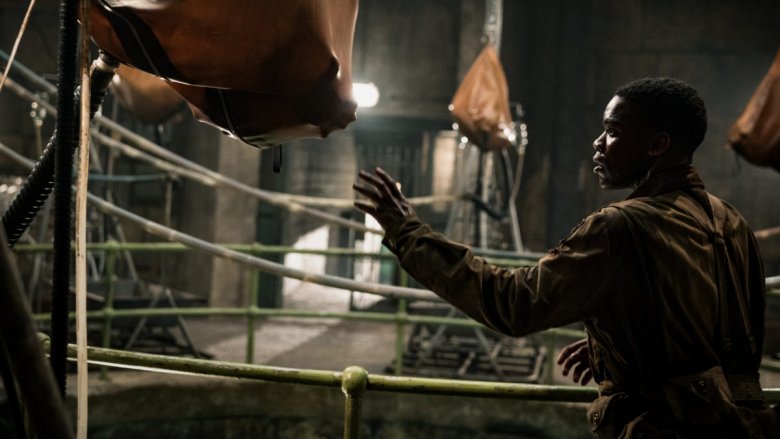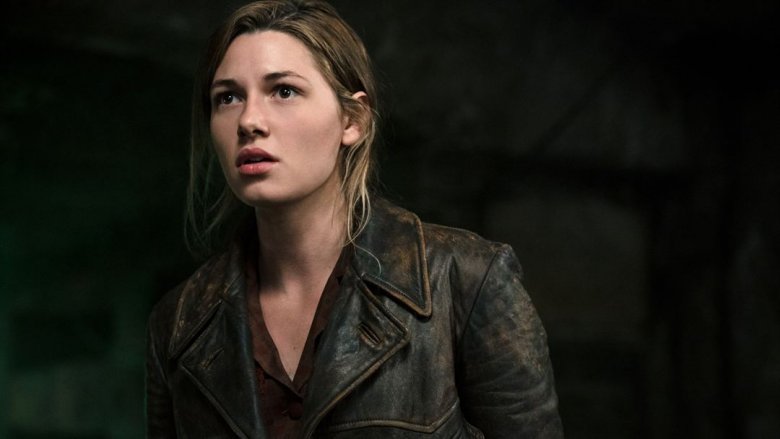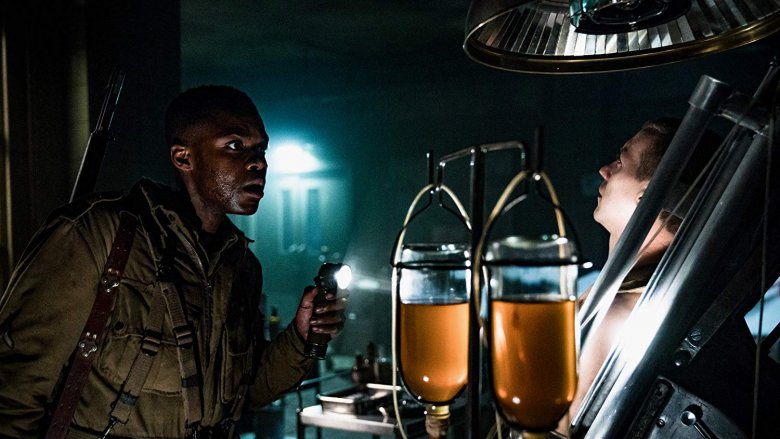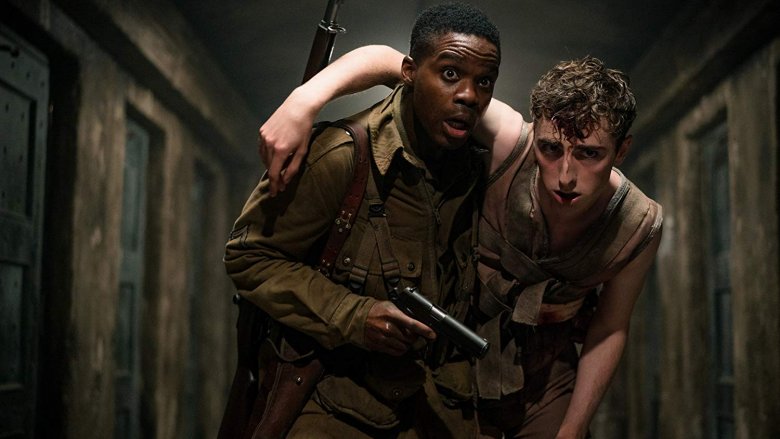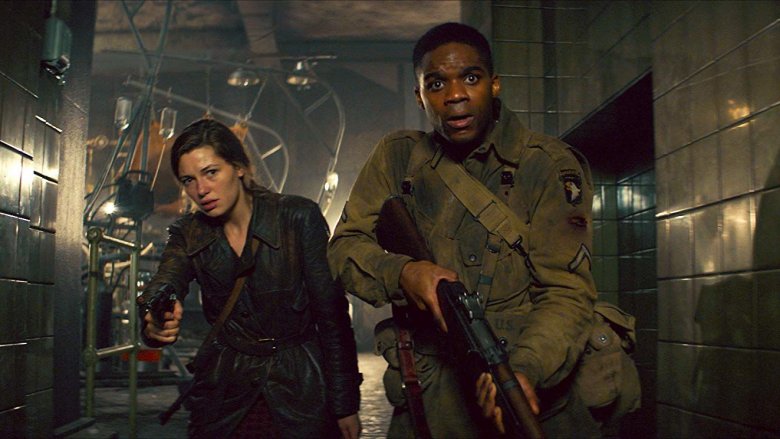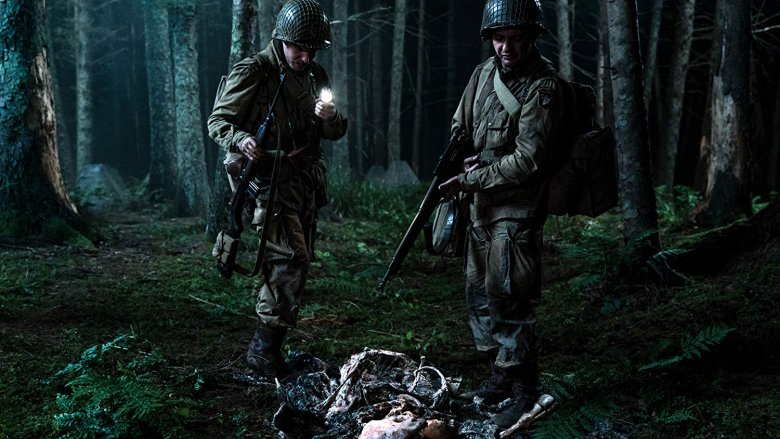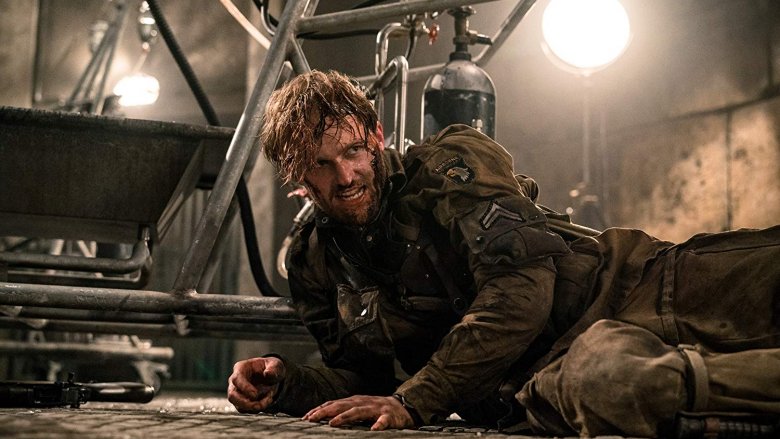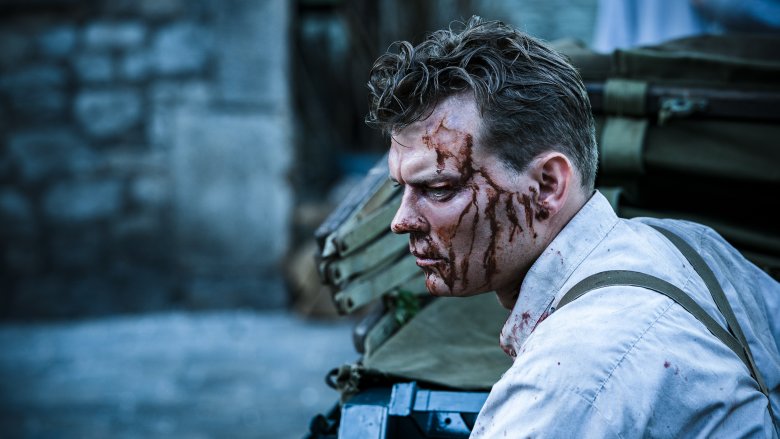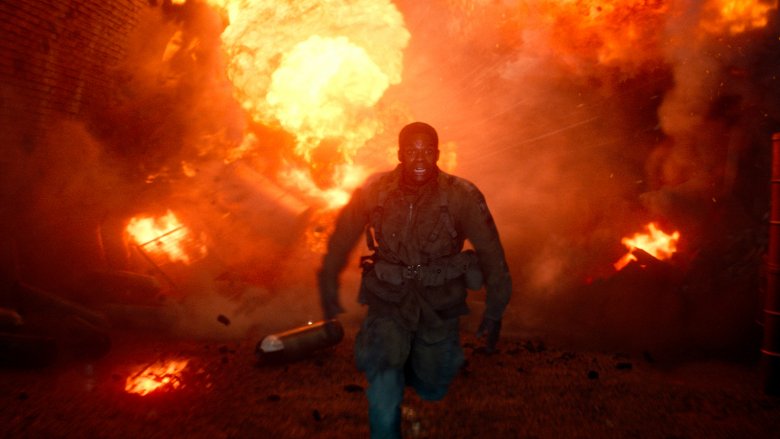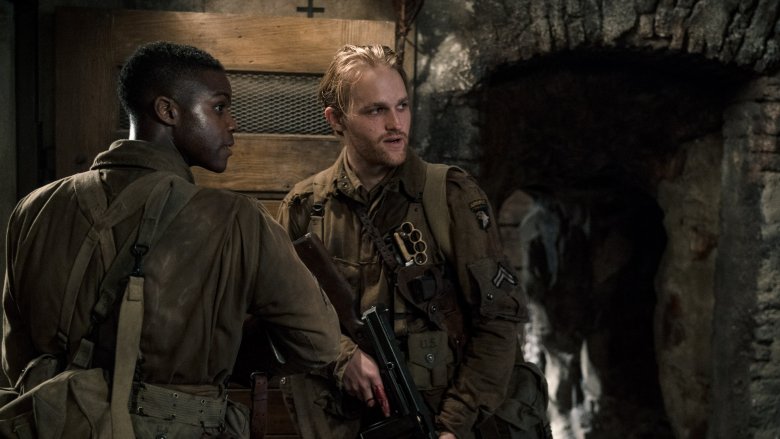The Ending Of Overlord Explained
Overlord has arrived. Director Julius Avery's mash-up of drama at the turning point of World War II and Nazi science experiments straight out of Wolfenstein is finally here, riding a strong wave of critical buzz as it lands in theaters for viewers eager for a little pulpy period horror fun. Overlord is a lean, mean movie, not wasting a second of its runtime as its gets right to the good stuff, and it never lets up until its thrilling conclusion. Even with that kind of storytelling focus, though, the film also manages to build an intriguing mythology around its edges, setting up a series of events both before and after the story proper that will keep fans talking for hours after they leave the theater. How deep do those Nazi experiments go? What happens to the characters after this adventure is over? Is the rest of World War II this weird in this universe? It's time to ponder these questions and more as we explain the ending of Overlord.
SPOILERS AHEAD for all of Overlord, obviously.
Other victims
Before our reluctant heroes from the U.S. Army even get a whiff of what's going on in the lab beneath the village's church, they enter the home of Chloe (Mathilde Ollivier) and encounter the creepy sounds coming from a bedroom with a door that's slightly ajar. Chloe tells them her aunt is inside, and that she's "very sick." When we do get a brief glimpse of the aunt, it appears she's very sick indeed, and Chloe confirms that the illness is the result of experimentation done by the Nazis at the church. Then the action picks up, and the aunt's illness is barely mentioned again. While our heroes are busy blowing up the lab, though, it's hard not to wonder: How many people did the Doctor experiment on only to release back to their homes at some point? How did he decide who got released? Will they live? Are they forever changed? How many of them are there and how far back does that trail stretch? Even if the evidence of the lab itself is gone, the victims are not, and it's pretty likely that someone from the Allied Forces will find them.
A mysterious substance
As Boyce (Jovan Adepo) and his compatriots dig further into what's really going on beneath the church, they are informed by Wafner (Pilou Asbaek) that the mysterious experiments are all based on a substance that somehow occurs naturally beneath the church, which seems to have the capability to reanimate dead bodies if properly refined. The Nazis haven't perfected the process yet, but the serum clearly has some powerful (if destructive) effects, and they seem to have a constant supply of it at the ready thanks to the tar they've found in the ground beneath the village, which was apparently there the whole time. By the end of the film, the lab is gone, but if the tar was there all along, isn't it possible that there's a good deal more of it down there? If so, what made it so special in this particular place, and how was that discovered? If this much progress has been made in this one French village, it's likely that other Nazis are aware of the tar's capabilities, and they're already looking for more elsewhere in Europe. The lab might be destroyed, but the search for the substance that can grant a Thousand Year Reich is definitely not.
A wounded soldier
By the end of the battle, the few survivors of the Overlord mission are free to take a little breather in the village, recovering from their wounds and their shock, but one of these survivors is not like the others. Yes, Boyce, Chloe, and Tibbet (John Magaro) all went through hell, but only Rosenfeld (Dominic Applewhite) was an actual victim of the lab and its experiments himself. After vanishing during the jump, he was captured by the Nazis, strapped down to a table, and fitted with a brutal device that seemed to puncture his lung so air could be pumped in, keeping him alive. Boyce was able to rescue him, and he managed to make some major contributions to the rest of the mission, but it's never fully explored exactly what he saw and what was done to him while he was in the lab. Sure, it could have just been life support, but he recovers from his wounds very quickly, and the details are never discussed. It's not certain, but it's quite possible Rosenfeld made it out of that lab with more than just his life.
A future for Chloe and Paul
Overlord takes as many genre liberties as it wants, but it also follows certain war movie structural conventions, and perhaps nowhere is that more evident than in the story of Chloe and her little brother Paul (Gianny Taufer), who bond with the soldiers after they hole up in their house. Foreign allies who befriend American soldiers are common in films like this, but Overlord leaves the ultimate resolution of this friendship open-ended. Paul and Tibbet grow very close by the end of the film, and while we never get a kiss to seal the deal, a romantic connection between Boyce and Chloe is heavily implied. What happens now? Do the soldiers just move on and leave these two to rebuild their lives? They might be separated temporarily, but the bonding experience of the mission and Boyce's very sensitive soul makes it seem unlikely. He might march on to Berlin, but he'll ultimately be back for the French girl he met after landing in Europe.
Precursor experiments
It's clear from what little we know of the Nazis' actual scientific process that there's been a lot of trial and error involved in the serum they're developing, and we don't actually know how they realized they could use the tar beneath the church for that purpose in the first place. Overlord is a film that brilliantly plays on decades-old reports and rumors of secret Nazi programs geared towards all sorts of things, so the film can gleefully take as many liberties as it wants in that regard. This atmosphere, plus the strange dead animal the soldiers discover in the woods, hint that there were definitely experiments of a different kind at work in this village before the serum was developed to the degree it is when we first see it. Was the doctor up to some kind of gene splicing? Was he trying to create hybrid war dogs of some kind? We don't know, but it's likely the results of those tests are still floating around in the Nazi bureaucracy somewhere.
Allied experiments
Though the serum is already healing his body by the time the lab is set to blow, Ford (Wyatt Russell) tells Boyce to abandon him and let him die with the rest of the experiment, because neither side should have whatever dark power the serum works on the human body. He's got a point, but his point also raises some other interesting questions about the world of the film. This is a movie that takes "Nazis did secret science experiments" to its logical extreme and presents us with German scientists reanimating dead bodies, then it tells us one soldier who's clearly seen a lot is worried about the serum falling into the wrong hands. This suggests, of course, that the Allies would be very interested in bringing back the dead, but it also suggests something that's perhaps even darker. If the Nazis were willing to go this far, how far were the Allies willing to go? What dark money has been poured into American and British and Russian experiments to keep the war effort going at all costs? Perhaps there's a sequel there...
Other villages, other doctors
It's possible that the village in Overlord, with its mysterious underground substance capable of restoring human life in some demented form, is an isolated place. Maybe there's literally nothing else like it in Europe, and by blowing up the lab Boyce managed to contain it so that no one can ever access such a thing for any purpose ever again. We're talking about the Third Reich, though, a place with a seemingly endless capacity for exploration into the bizarre, and the world of the film makes it clear that the Nazis are absolutely not shy about digging for every single advantage. So, even if the tar and the serum are confined to one village, it's impossible to imagine this world without other doctors in other villages, working on some other terrifying projects that could prolong Hitler's reign. It may not be a death-cheating serum that makes people into monsters, but it's surely terrifying, and it's surely out there somewhere.
Up from the ashes
Boyce and Ford very clearly packed the Nazi lab with a massive amount of plastic explosive, and the thrilling long take of Boyce fleeing the facility makes it quite clear that the explosives did their job. The place was reduced to ashes, and it's quite possible nothing salvageable remains there. Still, one of the film's final moments leaves the door open for something else. During his debriefing, Boyce's superior asks him if there was anything else beneath the church other than the radio tower control room. Boyce says no, and makes up a story about Ford believing the tower could only be taken down from the inside. The superior then asks one more time if there's anything else the Allies should be looking for in the rubble, and Boyce again says no. With all the shady dealings happening in this film, though, it seems likely that someone in the chain of command wouldn't necessarily take Boyce at his word, and would go looking. Sure, they might find nothing, but since the facility was specifically devoted to keeping dead things from staying dead... it's possible something's still wriggling around down there.
Boyce's military future
At the beginning of Overlord, Ford is the rough, cynical officer who's been through hell and isn't about to go soft for anyone, while Boyce is the innocent young trainee who's terrified of war and once proved himself too sensitive to even kill a mouse. By the end of the film, Ford is dead, and Boyce has absorbed many of his lessons. He's capable of killing, thinking on his feet, and winning in a hard fight, even if much of his innocence and compassion has been preserved. We know that Boyce isn't likely to just leave Chloe in the village forever, but what about the rest of his military career? If the film adheres to the same World War II timeline (it might not, but let's assume) then Boyce still has nearly a year of fighting left to do, and then he might be left in Europe to clean up after the Nazis when Germany surrenders. He's had experience with the supernatural now, even if he's not telling anyone about it. Will he just leave that in his past, or will he be keeping any eye open for other Nazi facilities like the one beneath the church, ready to strike as necessary? We're betting on the latter.
